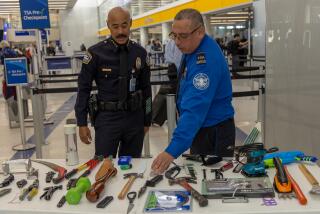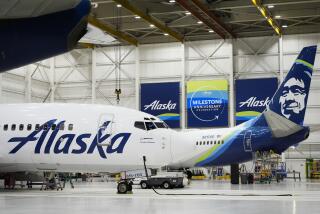What is ‘lasing’ and why is the FBI really worried about it?
Nearly 11 aircraft a day around the country had a laser pointer aimed at them in 2013, an increasingly worrisome trend that has inspired the FBI to offer $10,000 rewards to people who help officials catch laser-shining culprits.
“Aiming a laser pointer at an aircraft is a serious matter and a violation of federal law,” Ron Hosko, assistant director of the FBI’s Criminal Investigative Division, said in a statement Tuesday. “It is important that people understand that this is a criminal act with potentially deadly repercussions.”
Law enforcement officials have tried to crack down on “lasing” for the last two years, but this appears to be the first time dedicated rewards are being offered. As part of the two-month campaign launched Tuesday, the FBI and the Air Line Pilots Assn. International will work with Clear Channel Outdoor to hang billboards and issue public service announcements in 12 cities warning people not to risk a prison sentence to pull a dangerous prank.
Pilots have said that lasers aimed through the cockpit windows can temporarily blind them while obscuring potentially all visibility through the windshield. A handful of pilots each year on average require medical attention after a laser attack, the FBI said.
“The risk associated with illegal and inappropriate laser illuminations is unacceptable,” said Lee Moak, president of the 50,000-member Air Line Pilots Assn. International. “Pointing lasers at aircraft in flight poses a serious safety risk to the traveling public.”
If disoriented, pilots are urged to take one of several actions, including relying on automated flight controls, aborting a landing and turning up lighting within the cockpit.
The FAA can fine offenders $11,000 per incident. During the last two years, the FAA has opened 152 investigations and brought 96 enforcement actions.
But laser strikes also are punishable in criminal court by a fine of up to $250,000 and up to five years in prison.
Last month, 23-year-old Charles Mahaffey of Clovis was sentenced to 1 year, 9 months in federal prison for pointing a laser at a sheriff’s helicopter in Fresno. He had pleaded guilty and said that he “just can’t help himself from doing stupid things,” according to the U.S. attorney’s office.
Teenagers and adults between age 35 and 45 have also being among the sentenced offenders.
The cities included in the regional reward program are: Albuquerque, Chicago, Cleveland, Houston, Los Angeles, New York, Philadelphia, Phoenix, Sacramento, San Antonio, San Juan in Puerto Rico and Washington.
Los Angeles airports were first with a regional total of 147 and Houston was third with 126 reports, according to the FAA. Portland, Ore., which was second in the nation with 139 laser strike reports in 2013, was not included.
Most of the strikes happen overnight, and flights between 3 a.m. and 4 a.m. are especially susceptible, the FBI said. Almost all of the laser incidents involve a green-colored beam, which are more visible to the human eye than red beams, according to the FAA.
Year Number of reported laser incidents
2004 46
2005 283
2006 384
2007 590
2008 913
2009 1,527
2010 2,836
2011 3,591
2012 3,482
2013 3,960
Source: FAA
Follow LATimes National at: https://www.facebook.com/LATimesNational
ALSO:
May the best dog win at Westminster Kennel Club competition
Seattle police arrest man, say he threatened to blow up Jewish center
Same-sex marriage roundup: Nevada, Utah, Oklahoma, Ohio, Indiana
More to Read
Sign up for Essential California
The most important California stories and recommendations in your inbox every morning.
You may occasionally receive promotional content from the Los Angeles Times.











